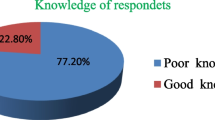Abstract
Informed consent refers to the process by which the physician and patient agree to a plan formulated concerning the patient’s care. Medicolegal cases throughout the twentieth century provide the framework for the discussion of informed consent. Informed consent is comprised of both the physician informing and disclosing information to the patient and also the patient consenting to the formulated plan of care. In female pelvic medicine and reconstructive surgery, patients derive information about procedures not only from their clinicians but also from other sources. Recent litigation regarding mesh complications enforces the need for physicians to thoroughly and clearly communicate with patients about their treatment choices so they can make an informed decision regarding their treatment plan.
Access this chapter
Tax calculation will be finalised at checkout
Purchases are for personal use only
Similar content being viewed by others
References
Hippocrates Z. Decorum. Cambridge: Harvard University Press; 1967.
Katz J. Reflections on informed consent: 40 years after its birth. J Am Coll Surg. 1998;186(4):466–74.
Eddy DM. Practice policies: where do they come from? JAMA 1990;263(9):1265, 9, 72 passim.
Evidence-Based Medicine Working Group. Evidence-based medicine. A new approach to teaching the practice of medicine. JAMA. 1992;268(17):2420–5.
Dolgin JL. The legal development of the informed consent doctrine: past and present. Camb Q Healthc Ethics. 2010;19(1):97–109.
Schloendorff v. The Society of New York Hospital; 1914.
Salgo v. Leland Stanford Jr. University Board of Trustees; 1957.
Canterbury v. Spence, 464 F.2d 772; 1972.
Childers R, Lipsett PA, Pawlik TM. Informed consent and the surgeon. J Am Coll Surg. 2009;208(4):627–34.
Miller D, Milani AL, Sutherland SE, Navin B, Rogers RG. Informed surgical consent for a mesh/graft-augmented vaginal repair of pelvic organ prolapse. Consensus of the 2nd IUGA grafts roundtable: optimizing safety and appropriateness of graft use in transvaginal pelvic reconstructive surgery. Int Urogynecol J. 2012;23(Suppl 1):S33–42.
Schenker Y, Meisel A. Informed consent in clinical care: practical considerations in the effort to achieve ethical goals. JAMA. 2011;305(11):1130–1.
Will JF. A brief historical and theoretical perspective on patient autonomy and medical decision making: part I: the beneficence model. Chest. 2011;139(3):669–73.
Will JF. A brief historical and theoretical perspective on patient autonomy and medical decision making: part II: the autonomy model. Chest. 2011;139(6):1491–7.
Stain SC. Informed surgical consent. J Am Coll Surg. 2016;222(4):717–8.
Barber MD, Maher C. Epidemiology and outcome assessment of pelvic organ prolapse. Int Urogynecol J. 2013;24(11):1783–90.
Hickson GB, Clayton EW, Githens PB, Sloan FA. Factors that prompted families to file medical malpractice claims following perinatal injuries. JAMA. 1992;267(10):1359–63.
Beckman HB, Markakis KM, Suchman AL, Frankel RM. The doctor–patient relationship and malpractice. Lessons from plaintiff depositions. Arch Intern Med. 1994;154(12):1365–70.
Tamblyn R, Abrahamowicz M, Dauphinee D, Wenghofer E, Jacques A, Klass D, et al. Physician scores on a national clinical skills examination as predictors of complaints to medical regulatory authorities. JAMA. 2007;298(9):993–1001.
Langewitz W, Denz M, Keller A, Kiss A, Ruttimann S, Wossmer B. Spontaneous talking time at start of consultation in outpatient clinic: cohort study. BMJ. 2002;325(7366):682–3.
Rhoades DR, McFarland KF, Finch WH, Johnson AO. Speaking and interruptions during primary care office visits. Fam Med. 2001;33(7):528–32.
Hojat M, Louis DZ, Markham FW, Wender R, Rabinowitz C, Gonnella JS. Physicians’ empathy and clinical outcomes for diabetic patients. Acad Med. 2011;86(3):359–64.
Street Jr RL, Makoul G, Arora NK, Epstein RM. How does communication heal? Pathways linking clinician–patient communication to health outcomes. Patient Educ Couns. 2009;74(3):295–301.
Neuwirth ZE. Physician empathy—should we care? Lancet. 1997;350(9078):606.
Kim SS, Kaplowitz S, Johnston MV. The effects of physician empathy on patient satisfaction and compliance. Eval Health Prof. 2004;27(3):237–51.
Kinnersley P, Phillips K, Savage K, Kelly MJ, Farrell E, Morgan B, et al. Interventions to promote informed consent for patients undergoing surgical and other invasive healthcare procedures. Cochrane Database Syst Rev. 2013;7:CD009445.
Tenggardjaja CF, Moore CK, Vasavada SP, Li J, Goldman HB. Evaluation of patients’ perceptions of mesh usage in female pelvic medicine and reconstructive surgery. Urology. 2015;85(2):326–31.
Koski ME, Chamberlain J, Rosoff J, Vaughan T, Kaufman MR, Winters JC, et al. Patient perception of transvaginal mesh and the media. Urology. 2014;84(3):575–82.
Anger JT, Lee UJ, Mittal BM, Pollard ME, Tarnay CM, Maliski S, et al. Health literacy and disease understanding among aging women with pelvic floor disorders. Female Pelvic Med Reconstr Surg. 2012;18(6):340–3.
Frequently asked questions by providers mid-urethral slings for stress urinary incontinence. In: AUGS/SUFU, editor. 2014.
Schenker Y, Fernandez A, Sudore R, Schillinger D. Interventions to improve patient comprehension in informed consent for medical and surgical procedures: a systematic review. Med Decis Mak. 2011;31(1):151–73.
Davis TC, Crouch MA, Wills G, Miller S, Abdehou DM. The gap between patient reading comprehension and the readability of patient education materials. J Fam Pract. 1990;31(5):533–8.
Reagan KM, O’Sullivan DM, Harvey DP, Lasala CA. Readability of patient information pamphlets in urogynecology. Female Pelvic Med Reconstr Surg. 2015;21(2):63–5.
Easton P, Entwistle VA, Williams B. Health in the ‘hidden population’ of people with low literacy. A systematic review of the literature. BMC Public Health. 2010;10:459.
Author information
Authors and Affiliations
Corresponding author
Editor information
Editors and Affiliations
Rights and permissions
Copyright information
© 2017 Springer International Publishing AG
About this chapter
Cite this chapter
Tenggardjaja, C.F. (2017). Patient Consent and Patient Perception of Complications. In: Goldman, H. (eds) Complications of Female Incontinence and Pelvic Reconstructive Surgery. Current Clinical Urology. Humana Press, Cham. https://doi.org/10.1007/978-3-319-49855-3_2
Download citation
DOI: https://doi.org/10.1007/978-3-319-49855-3_2
Published:
Publisher Name: Humana Press, Cham
Print ISBN: 978-3-319-49854-6
Online ISBN: 978-3-319-49855-3
eBook Packages: MedicineMedicine (R0)




